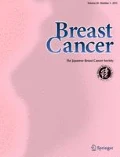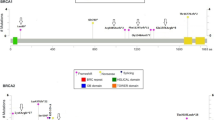Abstract
Background
Of individuals with suspected hereditary breast and ovarian cancer (HBOC), approximately 30–70 % do not harbor mutations in either BRCA1 or BRCA2 gene, which suggests that these individuals have other genetic or epigenetic alterations that could lead to the onset of this hereditary disease. We have recently identified OLA1 as a novel BRCA1/BARD1-interacting protein. In the present study, we aimed to elucidate whether any genetic mutations in OLA1 are detected among patients with suspected HBOC without BRCA1 or BRCA2 mutations.
Methods
Among 53 patients with suspected HBOC enrolled at Hoshi General Hospital, 23 patients without any BRCA1 or BRCA2 mutations were analyzed for OLA1 mutations. Genomic DNA was extracted from the peripheral blood samples. PCR and Sanger sequencing were performed to elucidate whether there were any mutations in any of the ten exons and flanking introns of the OLA1 gene.
Results
No germline sequence variation was detected in the OLA1 gene among the 23 patients enrolled in this study.
Conclusions
No germline mutations were found in the OLA1 gene among the cohort of patients with suspected HBOC without BRCA1 or BRCA2 mutations. Further studies are needed to clarify whether other mutations/epigenetic alterations are involved in the pathogenesis of BRCA1 or BRCA2 mutation-negative inherited disease with breast or ovarian cancer.
Similar content being viewed by others
References
Cancer Statistics in Japan 2014. Foundation for Promotion of Cancer Research (FPCR): Tokyo, Japan; 2015. p. 115.
Nakamura S, Takahashi M, Tozaki M, Nakayama T, Nomizu T, Miki Y, et al. Prevalence and differentiation of hereditary breast and ovarian cancers in Japan. Breast Cancer. 2015;22:462–8.
Shiovitz S, Korde LA. Genetics of breast cancer: a topic in evolution. Ann Oncol. 2015;26:1291–9.
Michailidou K, Beesley J, Lindstrom S, Canisius S, Dennis J, Lush MJ, et al. Genome-wide association analysis of more than 120,000 individuals identifies 15 new susceptibility loci for breast cancer. Nat Genet. 2015;47:373–80.
Michailidou K, Hall P, Gonzalez-Neira A, Ghoussaini M, Dennis J, Milne RL, et al. Large-scale genotyping identifies 41 new loci associated with breast cancer risk. Nat Genet. 2013;45:353–61 (61e1–2).
Ransburgh DJ, Chiba N, Ishioka C, Toland AE, Parvin JD. Identification of breast tumor mutations in BRCA1 that abolish its function in homologous DNA recombination. Cancer Res. 2010;70:988–95.
Matsuzawa A, Kanno S, Nakayama M, Mochiduki H, Wei L, Shimaoka T, et al. The BRCA1/BARD1-interacting protein OLA1 functions in centrosome regulation. Mol Cell. 2014;53:101–14.
Sjoblom T, Jones S, Wood LD, Parsons DW, Lin J, Barber TD, et al. The consensus coding sequences of human breast and colorectal cancers. Science. 2006;314:268–74.
Kais Z, Chiba N, Ishioka C, Parvin JD. Functional differences among BRCA1 missense mutations in the control of centrosome duplication. Oncogene. 2012;31:799–804.
Han X, Saito H, Miki Y, Nakanishi A. A CRM1-mediated nuclear export signal governs cytoplasmic localization of BRCA2 and is essential for centrosomal localization of BRCA2. Oncogene. 2008;27:2969–77.
Katagiri T, Kasumi F, Yoshimoto M, Nomizu T, Asaishi K, Abe R, et al. High proportion of missense mutations of the BRCA1 and BRCA2 genes in Japanese breast cancer families. J Hum Genet. 1998;43:42–8.
Sakayori M, Kawahara M, Shiraishi K, Nomizu T, Shimada A, Kudo T, et al. Evaluation of the diagnostic accuracy of the stop codon (SC) assay for identifying protein-truncating mutations in the BRCA1and BRCA2genes in familial breast cancer. J Hum Genet. 2003;48:130–7.
Economopoulou P, Dimitriadis G, Psyrri A. Beyond BRCA: new hereditary breast cancer susceptibility genes. Cancer Treat Rev. 2015;41:1–8.
De Brakeleer S, De Greve J, Loris R, Janin N, Lissens W, Sermijn E, et al. Cancer predisposing missense and protein truncating BARD1 mutations in non-BRCA1 or BRCA2 breast cancer families. Hum Mutat. 2010;31:E1175–85.
Ratajska M, Antoszewska E, Piskorz A, Brozek I, Borg A, Kusmierek H, et al. Cancer predisposing BARD1 mutations in breast-ovarian cancer families. Breast Cancer Res Treat. 2012;131:89–97.
Sun H, Luo X, Montalbano J, Jin W, Shi J, Sheikh MS, et al. DOC45, a novel DNA damage-regulated nucleocytoplasmic ATPase that is overexpressed in multiple human malignancies. Mol Cancer Res. 2010;8:57–66.
Acknowledgments
This study was supported in part by the grants-in-aid from the Ministry of Education, Science, Sports and Culture of Japan (M. T., N. C., and C. I., Grant Nos. 15H04307 and 24300327), the Cooperative Research Project Program of Joint Usage/Research Center at the Institute of Development, Aging and Cancer, Tohoku University (M. T., N. C., H. S., T. N., and C. I.) and the Princess Takamatsu Cancer Research Fund (14-24621) (N.C.).
Author information
Authors and Affiliations
Corresponding author
Ethics declarations
Conflict of interest
C. I. reports receiving lecture fees from Taiho, Chugai, Takeda, Byer, Pfeizer, Mochida, Asahikasei, Bristol-Myers Squibb, Daiichi-Sankyo, Merck Serono, and Novartis, and research funding from Chugai, Taiho, Bristol-Myers Squibb, Daiichi-Sankyo, Merck Serono, Yakult, Ono, and Novartis.
Additional information
M. Takahashi and N. Chiba contributed equally to this work.
About this article
Cite this article
Takahashi, M., Chiba, N., Shimodaira, H. et al. OLA1 gene sequencing in patients with BRCA1/2 mutation-negative suspected hereditary breast and ovarian cancer. Breast Cancer 24, 336–340 (2017). https://doi.org/10.1007/s12282-016-0709-0
Received:
Accepted:
Published:
Issue Date:
DOI: https://doi.org/10.1007/s12282-016-0709-0




